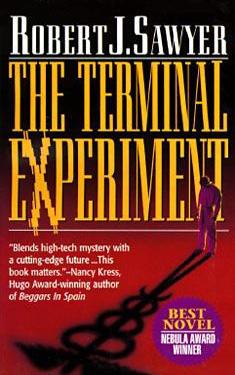Robert J Sawyer
Completed 1/30/2021, Reviewed 1/31/2021
4 stars
This is my third book by Sawyer. The first one I read, Hominids, won the Hugo in 2003. The second was Calculating God, nominated for several awards in 2001. This one won the Nebula for 1995. I liked it this book, even though it’s the same kind of pop-sci fi as the first. It’s really fast paced and easy reading. The plot isn’t bad and it’s not quite as soapy as the first. It also held up fairly well considering it was forecasting the evolution of PCs and the internet sixteen years in the future, which is now ten years in the past. Primarily, the tech talk isn’t too clunky. Overall, I found this a very entertaining book.
The
plot begins with the brilliant Dr. Peter Hobson who discovers an electrical matrix
in the brain that might be the soul.
This causes a worldwide sensation and has all sorts of implications. This feeds into Peter’s obsessions with life
after death and immortality, the later being something that’s being offered
with very expensive nanotechnology. So
Peter uses the device he used to record the “soulwave” to map his own neural
network and transfer it into a computer using AI software developed by a friend
of his. They create three entities: Spirit,
which is supposed to simulate life after death; Ambrotos, which is supposed to
simulate immortality; and Control, which is supposed to remain an unchanged
copy of Peter. Everything is going fine until
one of the AIs murders someone.
The
plot is kind of Crichton-esque, kind of poppy science fiction. But it works. Sawyer creates quite a thriller. The characters aren’t bad either, not wholly
three-dimensional, but fairly believable.
Peter, his wife Cathy, his brilliant programmer friend Sarkar, and the
detective Sandra Philo, all have some depth, but their relationships are a bit
soapy. The three AIs are a little hard
to differentiate, particularly when they are all talking with human Peter. I think this is intentional, though, reaffirming
that they are all copies of human Peter.
Sawyer
does a pretty good job of addressing the idea of morality and what kind of mind
would commit murder. Just what does it
take to cross over the line between wishing someone dead and actually causing a
death. Is it Spirit who is already dead
and has nothing to lose, or Ambrotos who has all the time in the world, or
Control who is the most like Peter? I
found it an interesting exercise to think through these options. I thought the reveal was a little obvious the
way the characters were running through the suspects, but at the same time, it
was exciting.
I
give this book four stars out of five because I enjoyed it so much. Is it great literature? Not really, but I didn’t care. I was caught up in the story and excited for
the reveal and capture of the murderous AI.
I didn’t mind the soapy characters.
Sawyer is considered the “Dean of Canadian Sci Fi” and I can see
why. His stuff is fun, accessible, and
thrilling.

No comments:
Post a Comment